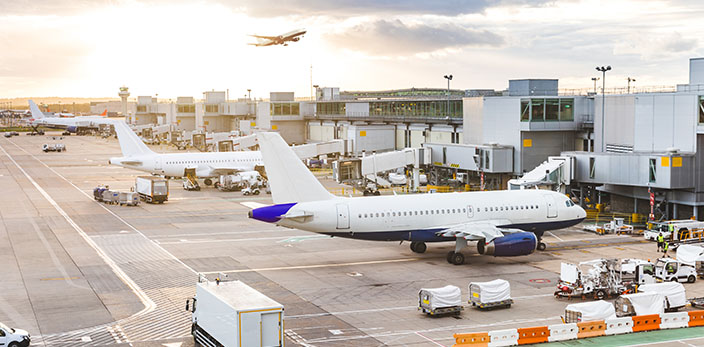In the aviation industry, language skills are more vital and necessary than ever before. Learn why.
Why Aviation Needs Language
With international travel rapidly increasing year by year, the aviation landscape has become more multicultural and globalized. But this comes with some challenges. How can an aviation professional perform well in a workplace environment that is so globally diverse?
Seeing that the aviation field involves people from different parts of the world, how can there be a means of “common ground” to better work and deliver good service?
The answer is this: as much as pilots, ground and traffic control, and flight staff today should have paramount knowledge of different aviation situations and operations, so should they with an indispensable skill — language.
Here are a few key reasons why it matters:

Global standard in a global world
With the expansion of travel in the 20th century, English has since then been the standard for aviation language (as well as other industries) around the globe— especially with aviation being an industry that operates internationally. This is due primarily to the potential of miscommunication being the cause of serious accidents.
Thus, the aim was to improve the quality of aviation worldwide, ultimately helping avoid misunderstanding and confusion over the radio and between international crews.
Since its recognition as a global standard, many aviation companies have made it a point to ensure their workforce is equipped with the right English language skills for clear and effective communication. More than this, proficiency in the language should be directly applicable to real-life aviation situations because just as every industry has its own jargon and terminologies, so does the aviation field.
The ability to speak, write and understand aviation meteorology, physics, navigation, electronics and avionics, rules of the air, and air traffic control regulations, is very important for international pilots and flight staff to do their jobs properly.
But don’t be too wary though, because the aviation landscape is continually escalating. So, even though it doesn’t look as if English will ever be replaced as the language of flight, the need for fluency in global languages such as French, Spanish, and Mandarin among others, is also expected to be widely used in the future.

Proficient language skills improve operations
The continued training and testing of language skills in the aviation industry aren’t just for increased language proficiency but also for operational excellence. Why is this so important? It’s because better coordination with one another leads to better work relationships, work ethic, and overall performance.
In order to carry out individual responsibilities better, there will always be a need to communicate with colleagues and those from various departments and sectors.
With aviation language focusing on voice-only communication, learning a work-related language (whether it be in English and/or other global languages) and effectively applying it on the job is vital.
Within the field of human factors, communication is frequently referenced and widely acknowledged to be fundamental. Nearly all human factors textbooks and manuals identify communication as a critical element of safe operations, citing both first-language and second-language interactions as contributory factors to numerous accidents and incidents.
That’s why a CAA report reads that “there should be no room for lack of language proficiency in international aviation.”

Poor language skills can lead to disasters
For aviation professionals, language skills aren’t just the key to service, but they are also paramount for safety. A wrong word or phrase said can adversely affect not just the smoothness of the flight, but also the safety of everyone on board. Without clear and succinct communication between the cockpit and ground control, a lot can go wrong.
Language-related miscommunication, including lack of ICAO (International Civil Aviation Organisation) proficiency standards, can bring about the threat of accidents upon take-off, in the sky, and upon landing.
An unfortunate example among the many there have been throughout the years, is the crew of Avianca Flight 52 failing to impart their critical fuel emergency to air traffic controllers which led to their fatal crash (73 dead).
The ICAO has acknowledged that “communications, or the lack thereof, has been shown by many accident investigations to play a significant role.”
That’s why many companies are making sure their workforce is not just equipped with the right technical skills for flight-related matters, but also the right language skills that directly affect the safety of both flight crew and passengers alike.
It also improves flight customer service
Passenger traffic (RPKs) is expected to grow 6% in 2019 and even more so in the coming years. Just imagine how many people that’ll be cruising the skies every day! So, in addition to language affecting their safety, so will it also affect in-flight service— in addition to aviation crew communication, of course.
Furthermore, language skills are directly linked to intercultural skills creating a distinctive advantage in apprehending intricate cultural aspects that are typically not communicated through spoken words.
Due to this, many top airlines have listed bilingualism or multilingualism as key recruitment requirements. It ensures efficiency, safety, and an aptitude to quickly adapt to a fast-growing multicultural, and dynamic aviation environment.
Language Skills Matter
Aviation language is certainly not a walk in the park. Especially as the world is becoming more and more interconnected and mobile. It directly affects passenger and crew safety, the seamlessness of operations, and giving the best customer service there is.
So why not train your workforce in a global language that not just serves as a support in an individual’s ongoing learning and development, but also trains them for worldwide competitiveness?
The time to start accelerating your language learning is now!




